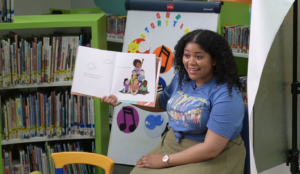
By Rebecca Castellano
U.S. Army Garrison Stuttgart
When kids couldn’t go to the library because of COVID-19 restrictions, they could turn to a creative online reading program hosted by library technician Raechele Butler.
Her videos, posted online by U.S. Army Garrison Stuttgart’s directorate of Families, Morale Welfare and Recreation, included songs and books for the community’s younger readers.
Now, with summer in full swing, readers across the community can take part in a new 2020 summer reading program, which kicked off June 11. This year’s theme is “Dig Deeper: read, investigate, discover,” Butler said.
“We have weekly themes that fit within our summer one,” said Butler. “Things like spies and detectives, investigations, science, digging into ancient civilizations or outer space. It’s all about being inquisitive, asking questions and exploring.”
COVID-19 forced the program, which is usually the biggest event for the library, to move to a virtual format. Butler said the shift gave her team a chance to be creative while overcoming obstacles.
“It’s challenging because our activities are science based or story time or action and movement,” Butler said “It’s really hard to dig in, when you’re not present and able to get your hands in there. But, I think we pulled it off well and we’re really excited to show everyone what we came up with.”
One positive aspect of the virtual program is that kids can complete each activity as many times as they want. Butler said it helps motivate her to know kids are creating laboratories in their own backyards.
“We definitely miss the reaction from silly songs, story time groups and science experiments, all the laughs and the oohs and ahhs,” Butler said. “But, I know it’s happening in living rooms and kitchens and bedrooms all over so it’s still very rewarding.”
Naama Krauz, a registered participant, uses the program to track her reading as well as her kids. She said that while her children read a lot before the program, the incentives help to keep them engaged.
“There are different challenges to help kids use all kinds of texts online and at home,” said Krauz. “They help expose children to various sorts of reading- reading for pleasure vs. reading for information.”
